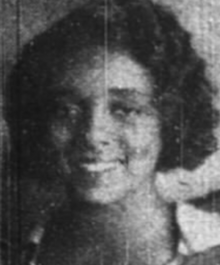Wezlynn Tildon
Wezlynn Margaret Develle Tildon (September 19, 1918 – August 15, 1993), sometimes billed as Wezlyn Tilden, was an American newspaper columnist and radio actress.
Early life and education[edit]
Tildon was born in Fort Worth, Texas, the daughter of J. Wesley Tildon Jr. and Bertine Washington Tildon. Her father was a physician.[1] Her uncle was Toussaint T. Tildon, director of the Veterans Hospital at Tuskegee.[2]
Tildon was raised mostly in Chicago,[3] but was a debutante in Harlem in 1939,[4][5] and was billed as "Harlem's Glamour Girl" in newspapers.[6][7] She graduated from Wadleigh High School for Girls in 1936, in the same class as composer Arlein Ford Straw.[8] She graduated from New York University in 1942; at NYU, she was president of the Dramatic Art Club, and the only Black drama student in her year.[9] She was a member of Alpha Kappa Alpha.[10] She also attended the University of California, Los Angeles (UCLA).[2]
Career[edit]
Tildon was junior society columnist for The New York Age newspaper,[11][12] and worked for the Treasury Department as a young woman.[13] In Chicago, she was a stage actress,[14] and a member of the W. E. B. Du Bois Theater Guild[15] and Skyloft Players.[16] She was in the cast of Here Comes Tomorrow (1947–1948),[17] the first all-Black radio soap opera to be broadcast in America.[18] She starred in several episodes of the radio drama anthology series Destination Freedom from 1948 to 1950,[19][20] playing historical figures such as Harriet Tubman, contralto Marian Anderson, poet Gwendolyn Brooks, and dancer Katherine Dunham.[21] She was also in the regular cast of the first program broadcast over the National Negro Network, The Story of Ruby Valentine (1954), a daily soap opera.[13]
Tildon wrote several songs, radio scripts, and stage plays, including The Cup (1948).[22] She also taught acting classes at the New Era Professional College in Chicago.[23] In 1954, she was "fan mail secretary" at the Today show.[24]
Personal life[edit]
Tildon died in 1993, at the age of 74, in Texas.
References[edit]
- ^ Foster, Laurence, ed. The Alumni Directory of Lincoln University (1946): 113.
- ^ a b "Wezlynn Tildon's father succumbs". Los Angeles Tribune. 1947-08-16. p. 12. Retrieved 2024-02-15 – via Newspapers.com.
- ^ "Mother and Deb". New Pittsburgh Courier. 1934-12-15. p. 8. Retrieved 2024-02-16 – via Newspapers.com.
- ^ "People". Time. 1939-07-03. ISSN 0040-781X. Retrieved 2024-02-15.
- ^ "Mother and Deb". New Pittsburgh Courier. 1934-12-15. p. 8. Retrieved 2024-02-16 – via Newspapers.com.
- ^ "Harlem's Glamour Girl". Omaha World-Herald. 1939-06-23. p. 25. Retrieved 2024-02-15 – via Newspapers.com.
- ^ "Harlem's Glamour Girl No. 1". Daily News. 1939-06-23. p. 236. Retrieved 2024-02-15 – via Newspapers.com.
- ^ "Graduated". The New York Age. 1936-07-04. p. 4. Retrieved 2024-02-15 – via Newspapers.com.
- ^ "Two Young Women Seniors Receive Honors from New York University". Opportunity. 20 (6): 185. June 1942.
- ^ "Wezlynn Tildon Voted No. 1 Girl of New York University's Senior Class; Nita Edwards Wins Award". The New York Age. 1942-05-23. p. 4. Retrieved 2024-02-15 – via Newspapers.com.
- ^ "Wezlynn Tildon Says". The New York Age. 1937-07-31. p. 4. Retrieved 2024-02-15 – via Newspapers.com.
- ^ "Wezlynn Tildon Says". The New York Age. 1940-06-15. p. 6. Retrieved 2024-02-15 – via Newspapers.com.
- ^ a b Ellett, Ryan. Encyclopedia of Black Radio in the United States, 1921–1955 (McFarland & Company 2012): 48, 146-147, 152-153.
- ^ "'Story of Ruby Valentine' starring Juanita Hall, Premieres on National Negro Network Jan. 25th". Jackson Advocate. 1954-01-23. p. 4. Retrieved 2024-02-16 – via Newspapers.com.
- ^ Tracy, Steven C. (2011-11-01). Writers of the Black Chicago Renaissance. University of Illinois Press. p. 189. ISBN 978-0-252-09342-5.
- ^ "Hail Langston Hughes' Poems at Fete Today". Chicago Tribune. 1947-06-08. p. 3. Retrieved 2024-02-15 – via Newspapers.com.
- ^ "Reviews of Winning Programs". Billboard. November 20, 1948. p. 6.
- ^ "Marshall Field Outlet Starts Air's First All-Negro Serial" Billboard (March 15, 1947): 5.
- ^ Durham, Richard; Macdonald, J. Fred (1989). Richard Durham's Destination freedom : scripts from radio's Black legacy, 1948-50. Internet Archive. New York : Praeger. p. 2. ISBN 978-0-275-93138-4 – via Internet Archive.
- ^ Dunning, John; Dunning, John (1998). On the air : the encyclopedia of old-time radio. Internet Archive. New York : Oxford University Press. pp. 196–197. ISBN 978-0-19-507678-3.
- ^ MacDonald, J. Fred (1978). "Radio's Black Heritage: Destination Freedom, 1948-1950". Phylon. 39 (1): 66–73. doi:10.2307/274433. ISSN 0031-8906. JSTOR 274433.
- ^ Library of Congress Copyright Office (1948). Catalog of Copyright Entries: Third series. p. 111.
- ^ "New Era Professional College (advertisement)". Chicago World. 1949-06-11. p. 9. Retrieved 2024-02-15 – via Newspapers.com.
- ^ "TV Fan Mail Secretary". Ebony. 9 (7): 5. May 1954 – via Internet Archive.

